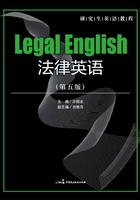
Ⅱ. Fill in the blanks with the legal terms given below and change the form if necessary.
legislative sovereignty executive due process Bill of Rights referendum unconstitutional separation of powers amendment, interpret
1. ____is a vote in which all the people in a country or an area are asked to give their opinion about or decide an important political or social question.
2. The 19 th ____to the U.S. Constitution gave women the right to vote.
3. The general rule is that an____ statute, though having the form and name of law is in reality no law, but is wholly void, and ineffective for any purpose.
4. The ____is an officially elected or otherwise selected body of people vested with the responsibility and power to make laws for a political unit, such as a state or nation.
5. An established course for judicial proceedings or other governmental activities designed to safeguard the legal rights of the individual are listed in the U.S. Constitution as____ .
6. Strict constructionism is when a judge____ the text only as it is spoken;once a clear meaning has been established, there is no need for further analysis, and judges should avoid drawing inferences from previous statutes or the constitution and instead focus on exactly what was written.
7. The____ enumerates freedoms not explicitly indicated in the main body of the Constitution, such as freedom of religion, freedom of speech, a free press, and free assembly.
8. In political theory, ____is a substantive term designating supreme authority over some polity.
9. The____ privilege, the right of the President to withhold certain information sought by another branch of government, was first claimed by President Jefferson in response to a subpoena from John Marshall in the famous treason trial of Aaron Burr.
10. The system of____ is an important part of the Constitution. With it, each of the three branches of government can limit the powers of the others.